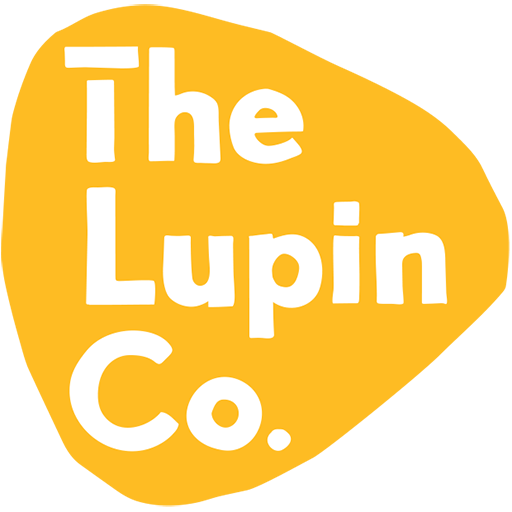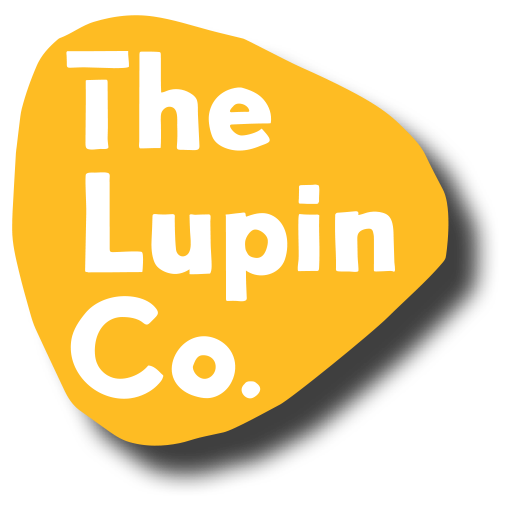What Are Lupins – Frequently Asked Questions
Frequently Asked Questions on Australian Lupins
The Lupin Co is a 100% Australian owned and operated food company that’s serious about making people’s lives healthier by putting a little TLC lupin food into their pantries. We are a vertically integrated company including prime Australian Sweet Lupin farms, a bespoke lupin manufacturing and packing facility near PERTH, Western Australia with Australian and global distribution of a range of consumer, retail, food service and commercial scale products. Our signature products are lupin flake, lupin flour, lupin hull/husk and lupin splits & kibble. Our quality systems include HACCP/GMP, Gluten-Free with Coeliac Australia, Kosher, Halal, USFDA and we are a Registered Export Establishment with Australian Government. Additional certifications are imminent including Organic and SQF.
Yes, our Lupin Flakes are certainly safe to eat raw should you wish to consume them in this way. It is very much a matter of your own taste and personal preference!
Australian Lupins have very low levels of the ‘anti-nutrients’ typically found in other legumes (e.g. soy and beans) which do require a soaking and cooking process. You don’t need to cook Lupin Flakes to make the protein or any other nutrients bio available and there is no loss of nutrients on moderate heating.
A simple no cook idea is to add to smoothies, energy balls or sprinkle on top of muesli or granola. Equally, you may prefer to add to your muesli or granola mix before baking or you may wish to add 2-3 tbsp to oats when making porridge.
Your Lupin Flakes will taste different depending on how you prepare them. For instance, lightly toasting brings out a delicious ‘nutty’ flavour! Whilst boiling for 3 minutes, straining and squeezing excess moisture, will result in a very mild, almost flavourless cous cous alternative. When boiled and used this way they act as a fantastic flavour ‘carrier’.
Have fun experimenting and finding your favourite ways to use TLC Lupin Flakes!
Lupins have been used as a food for humans and livestock for over 2000 years, however a long “debittering” or “brining” process was necessary to remove alkaloids (bitter tasting, mild toxins) that occur in traditional (Mediterranean) as well as New World (Americas) lupin varieties. You may be familiar with Lupini Beans which are the Mediterranean traditional type.
However over the last 60 years Australian plant breeders have developed very low-alkaloid varieties which have been selectively developed for human consumption. These varieties do not need any ‘debittering’ process and are so safe they can be consumed raw!
Dietary fibres are undigestible carbohydrates that are passed through to the large intestine providing our healthy gut flora with the food they need to flourish.
Not all fibres are created equal and they perform different roles in the gut. Soluble fibres slow down digestion and are good for cholesterol lowering, insoluble fibres are great for regularity and prebiotic fibres are very beneficial for stimulating the growth of friendly bacteria.
Lupin fibre is unique in that it acts as soluble, insoluble and prebiotic fibre.
Dietary fibre offers many health benefits, including potentially reducing the risk of coronary heart disease, stroke, hypertension, diabetes, obesity and certain gastrointestinal disorders.
Adequate intakes of dietary fibre may also improve blood lipid profiles, reduce blood pressure, improve glycaemic control, improve laxation, promote weight loss and improve immune function.
The National Health and Medical Research Council recommend that women and men consume at least 25g and 30g of fibre per day, respectively.
A standard 40g serve (or 4 tablespoons) of TLC Lupin Flakes provides 14.8g of fibre and 16g of protein.
One way of increasing the number of good bacteria in the gut is by eating foods that are high in dietary fibre and especially prebiotic fibres.
Lupin Flakes have a whopping 37g of fibre per 100g, with close to 1/3 of this fibre acting as a prebiotic fibre.
Clinical studies have shown that lupin fibre is exceptional at stimulating the growth of friendly bacteria.
Our lupins are harvested in very hot, dry conditions when the moisture content is very low, usually around the 8-9% mark. After harvest we clean and size the lupins before longer term storage into new condition hermetically sealed silo’s – this means no moisture ingress at all.
Following production into either flakes or flour, of which both are a dry process, we suggest the storage life is at least 2 years, most likely 3-4 years and we add this date to the batch details, printed on the packs.
With so little fat and being so dry, our lupins just don’t deteriorate in either flavour, texture or usability . Simply keep them in the sealed pack they came in, keep them in the cupboard nice and dry and enjoy them every day.
A prebiotic is a type of fibre. To be classified as a prebiotic, the fibre must pass through the digestive system undigested and stimulate the growth and/or activity of certain ‘good’ bacteria in the large intestine.
Prebiotic fibres include fructans and galacto-oligosaccharides (GOS).
Some health benefits attributed to prebiotic fibre intake include stimulation of gut flora, improved mineral absorption, possible protection against colon cancer, stabilisation of blood glucose and insulin levels, protection against intestinal infections and alterations in the progress of some inflammatory conditions.
Some foods such as legumes produce excessive wind. The wind is the result of excessive gas produced through the action of the gut microflora.
This often happens when people change from a low fibre diet to include very high fibre foods such as legumes.
We recommend you introduce these high fibre foods very gradually over 14 days.
This will give your gut and gut bacteria time to adapt to the greater quantity of fibre arriving in the large bowel.
If you have received a diagnosis of IBS from your doctor, you may have been placed on the ‘Monash University low FODMAP diet’.
The low FODMAP diet is a special therapeutic diet designed to alleviate the undesirable gastrointestinal symptoms associated with this condition.
You must seek the guidance of a qualified dietitian with experience in this area before incorporating any new foods, including Lupin Flakes, into your diet.
Lupins in Australia are typically grown on ‘acid – sands’, to assist very marginal soils become productive farming lands. These soil types are not suited for organic farming. Australian Lupins are an integral component for sustainable farming practices and are grown as a nitrogen fixer, offering great benefits to soil health.
However Australian Lupins are not a GM crop, they are not a “Round-up ready” or have any resistance to glyphosate. Therefore they are not sprayed with this chemical while they are growing in the ground.
Australian Lupins are also very hardy against insects, they have a very robust pod and a thick outer seed coat, so they are also generally not sprayed with pesticides. Both the pod and outer seed coat are removed in making our Lupin Flakes, also removing any potential residues that might be present.
At The Lupin Co, we screen our raw Australian Lupins to ensure we comply with the very high standards set by FZANZ for a multitude of chemical residues.
Lupin, like other protein containing foods (e.g. peanut, soybean) may trigger an allergic reaction in a small percentage of the population.
Some people who are allergic to peanuts may also react to lupin.
If you know or think you are allergic to lupin, it is important that you visit your doctor and ask for a referral to a clinical immunology/allergy specialist.
A link to the most recent International Regulatory Chart can be found at the following link – https://farrp.unl.edu/IRChart
Source: Australasian Society of Clinical Immunology and Allergy
For more information please review this document.
Click here to see instructions: Guide on how to find your stockists via postcode


